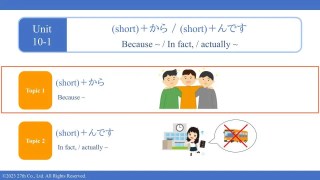Welcome to Lesson 10!
Ready to add depth and nuance to your Japanese conversations? Lesson 10 at gokigen japanese blog focuses on expressing why things are the way they are, sharing what you’ve done in your life, and telling others what they should or must do.
The main goals of this lesson are to enable you to understand and express:
- Reasons, circumstances, and explanations.
- Past experiences.
- Advice and obligations.
Key grammar patterns and expressions you will master in this lesson include:
- Expressing Reasons & Explanations: Learn different ways to say “because” using 〜から (kara) and 〜ので (node), and how to provide explanations or background information using 〜んです (n desu). Understand the nuances of when to use each.
- Sharing Experiences: Learn how to talk about things you have done at least once in your life using V-た + ことがある (koto ga aru), meaning “have the experience of ~”. This is perfect for sharing your background and experiences (e.g., 日本に行ったことがあります – I have been to Japan).
- Giving Advice: Learn a common and polite way to give suggestions or recommendations: V-た + ほうがいいです (hou ga ii desu), meaning “You should do ~” (or “You shouldn’t do ~” with the negative V-ない form).
- Stating Obligation: Understand how to express necessity or obligation – that something “must be done” or you “have to do ~”. You will learn the formal pattern V-なければ + いけません (nakereba ikemasen) and the more casual V-なきゃ + いけません (nakya ikemasen).
By the end of Lesson 10, you’ll be able to explain the reasons behind events, share your life experiences, give helpful advice, and state obligations for yourself or others. These are fundamental skills for richer, more meaningful communication!
Explore the articles linked below to master expressing reasons, experiences, advice, and obligation in Japanese!






